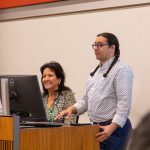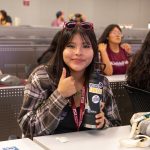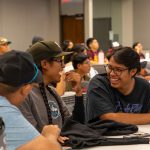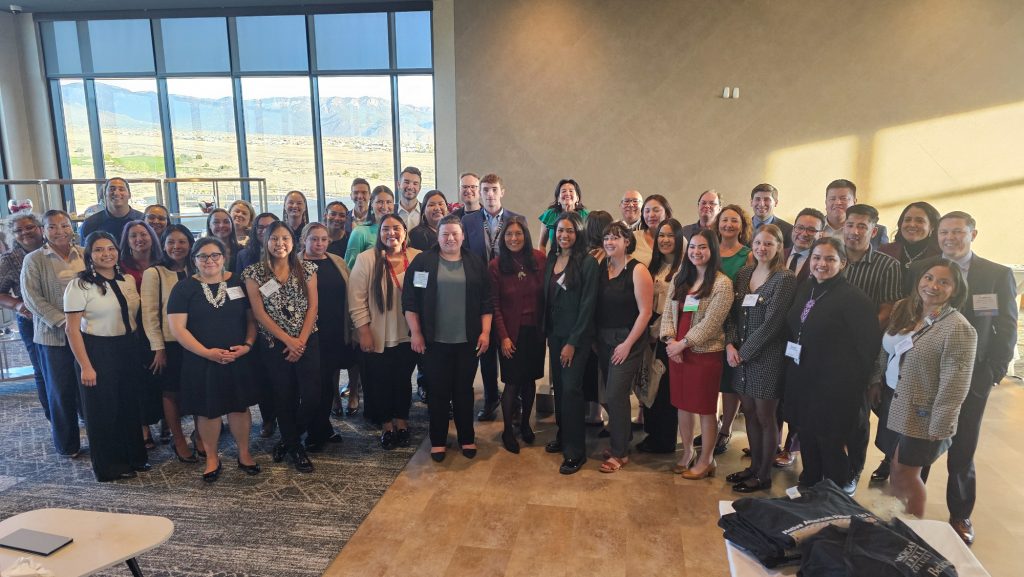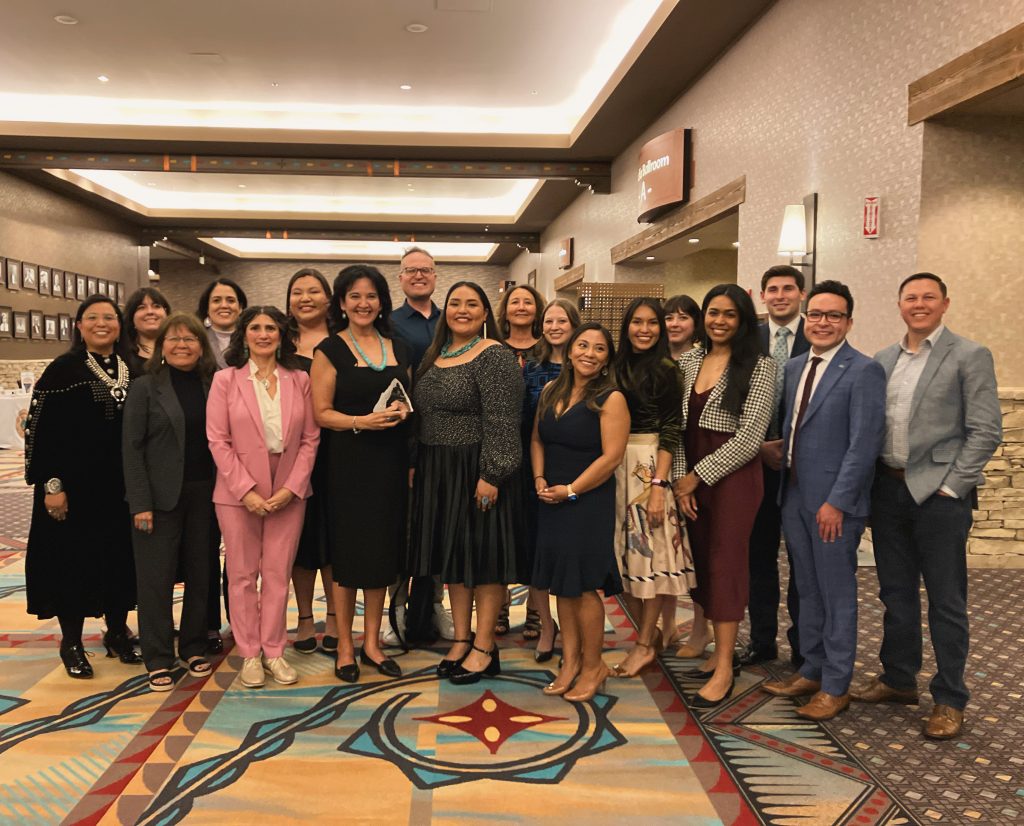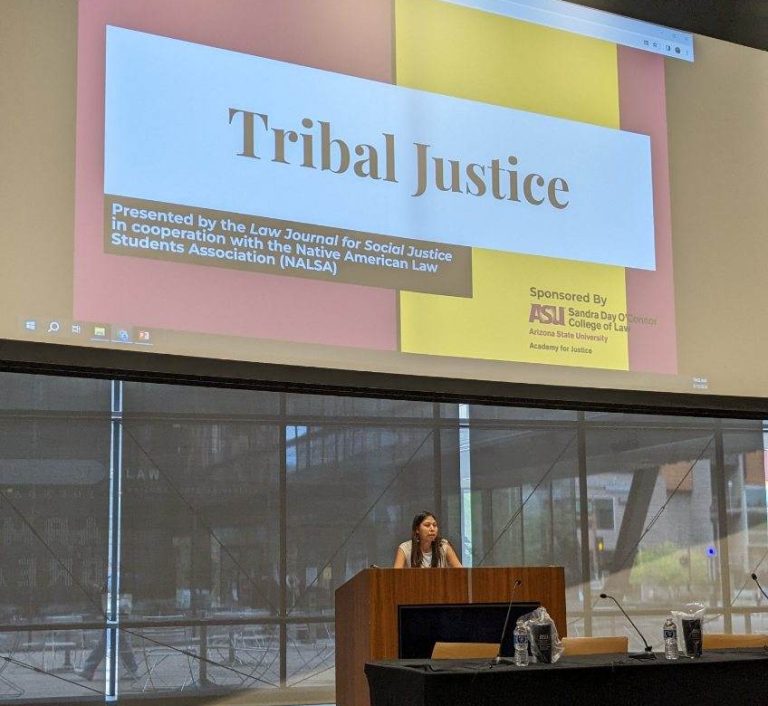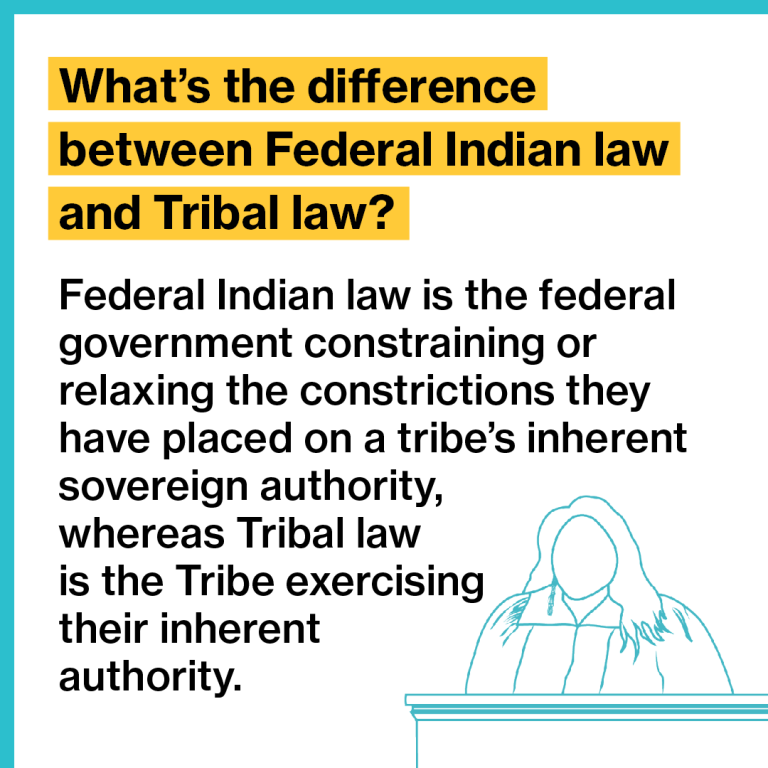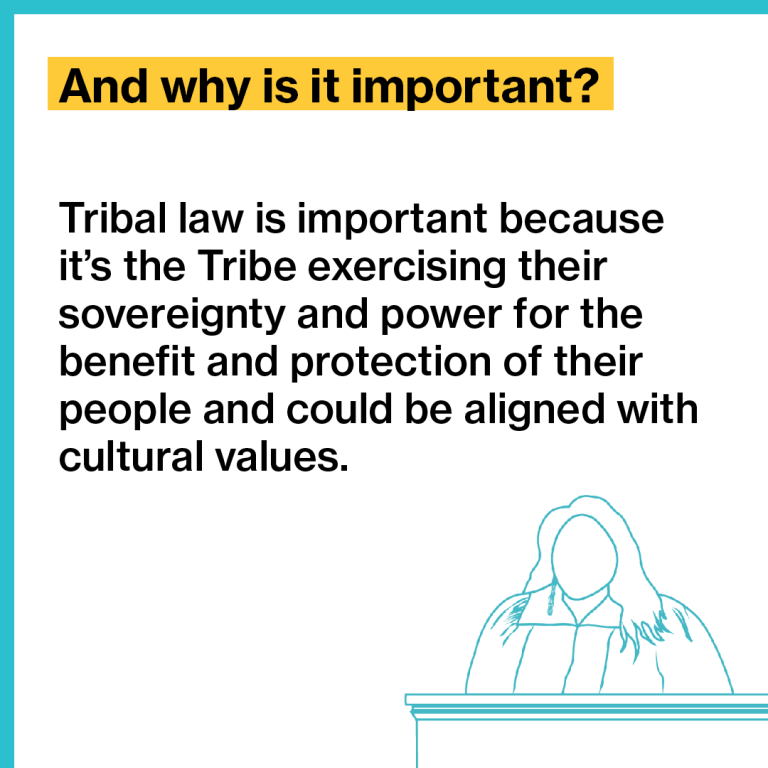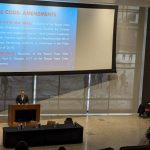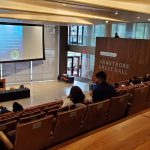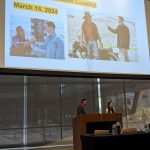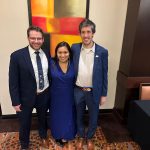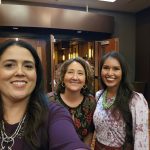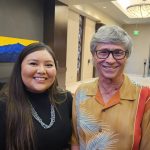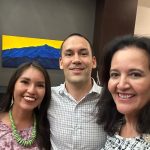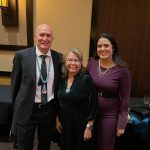Category Archives: Event
2025 ILP Alumni Awards: Call for Nominations
The ILP alumni awards are now open. Nominate your classmates and friends! The ILP Awards include Professional Achievement, Alumni Service Award, and Emerging Leader Award. Nominations are due February 21, 2025! Nomination materials should be sent by email to: Kate.Rosier@asu.edu. Awards will be presented at the ILP Alumni & Friends Awards Ceremony at Fed Bar on Tuesday, April 29, 2025 in Albuquerque, New Mexico.
Nomination Guidelines
ILP Professional Achievement Award – This award recognizes outstanding achievement in Indian Law or Tribal Law throughout an individual’s career. The award honors ILP alumni whose achievements in the field of Indian Law or Tribal Law have brought distinction to themselves and real benefit to the Indian community. Nomination Package Requirements:
- Describe the unique professional achievements in the field of Indian Law or Tribal Law that has brought distinction to the candidate. (maximum two pages)
- Describe the recognized contributions made by this candidate that demonstrate a benefit to the larger community. (maximum one page)
- Describe the ways in which the candidate’s achievements are truly extraordinary or exceptional. (maximum one page)
- Provide at least two letters of support from individuals that can speak to the candidate’s impact on his or her profession.
- Letters of support should speak to the magnitude of the individual’s impact in the practice of Indian or tribal law or in the Indian community.
- Provide a 200 word bio of the nominee.
- Past winners include: Claudeen Bates Arthur (’74) (Posthumous), Gloria Kindig (’89), Kathy Bowman (’86), Rob Rosette (’96), Diane Enos (’92), Ben Hanley (’71) and Herb Yazzie (’75).
ILP Alumni Service Award – This award is given for outstanding service to the Indian Legal Program, and is awarded for extended, extraordinary service to the Indian Legal Program. Nomination Package Requirements
- Describe the ways in which the candidate has served or supported the ILP and the ILP alumni. Examples can include serving on committees, boards, CLEs, mentoring ILP students, or other volunteer or fundraising efforts or funding commitments. (maximum one page)
- Describe the ways this service been truly extraordinary. (maximum one page)
- Describe how the candidate’s service has benefited the ILP. (maximum one page)
- Please provide at least two letters of support from ILP alumni as part of the nomination package.
- Provide a 200 word bio of the nominee.
- Past winners include: Brian Garcia (’20), Rebecca Ross (’10), Rodina Cave Parnall (’01), Peter Larson (’02), Verrin Kewenvoyouma (’04), Ann Marie Downes (’94), Mary Shirley (’92) and Jeff Harmon (’05).
ILP Emerging Leader Award – This award acknowledges and encourages service to Indian Country and the ILP by alumni who are less than ten years out of law school. The award recognizes outstanding achievements in their professional career, volunteer work, and promotion or support of the ILP and/or ASU NALSA. Nomination Package Requirements.
- Describe how the candidate has achieved professional success in their legal career.
- Describe the candidate’s volunteer work.
- Describe how the candidate achieved an exceptional level of service while balancing the demands of being a recent graduate. (maximum one page)
- Describe how the candidate was proactive in efforts to become involved in ILP and/or ILP alumni activities. (maximum one page)
- Describe how the candidate’s service has been sustained over a long period of time or how the service has been innovative or beneficial. (maximum one page)
- Provide two letters of support from fellow ILP alumni.
- Provide a 200 word bio of the nominee.
- Past winners include: Krystalyn Kinsel (’15), Stephanie Sfiridis (’16), Jacob Schellinger (’12), Derrick Beetso (’10), Carolyn Angus-Hornbuckle (’09), Nikki Borchardt Campbell (’09), Steve Bodmer (’06), Elizabeth Medicine Crow (’05), Charles Galbraith (’07), Matthew Campbell (’08) and Michael Corey Hinton (’11).
A historic journey
ILP students at the forefront of leadership and reconciliation
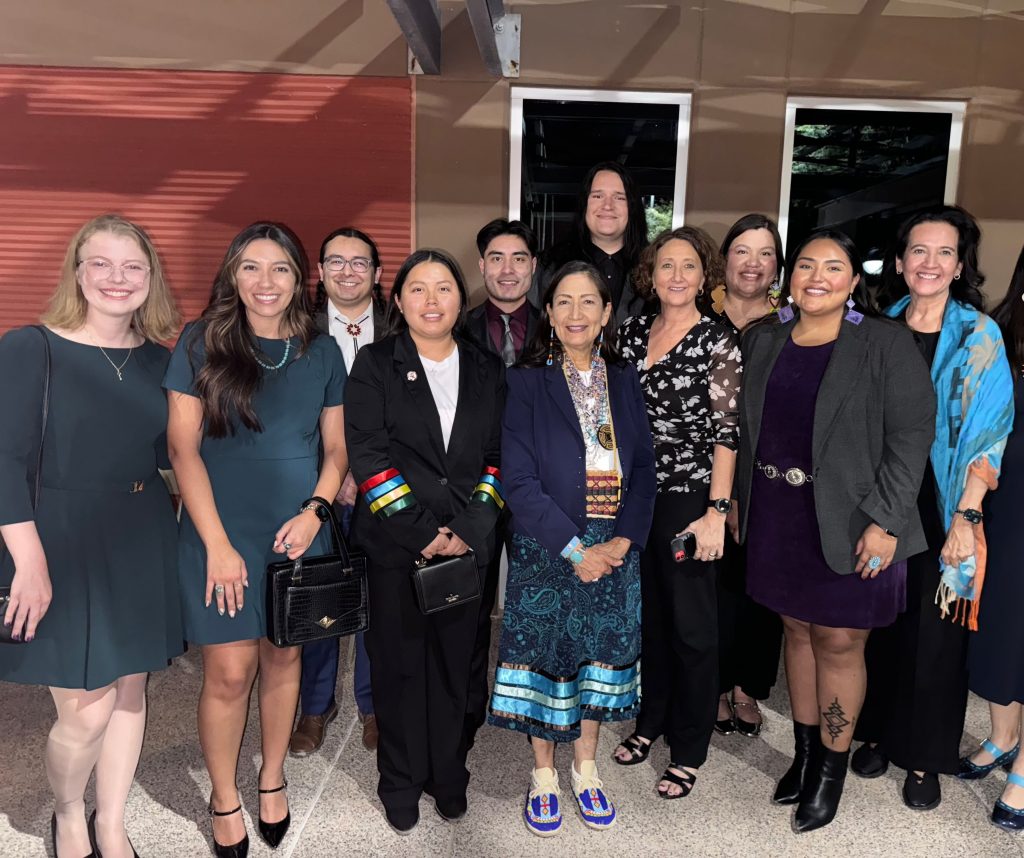
The Indian Legal Program (ILP) faculty, staff and students had the honor of attending a Welcome Reception on Oct. 24, hosted by Governor Stephen Lewis and the Gila River Indian Community. The event featured U.S. Interior Secretary Deb Haaland as the special guest. During the reception, students had the incredible opportunity to meet Secretary Haaland, Assistant Secretary Bryan Newland and Minnesota Lieutenant Governor Peggy Flanagan.
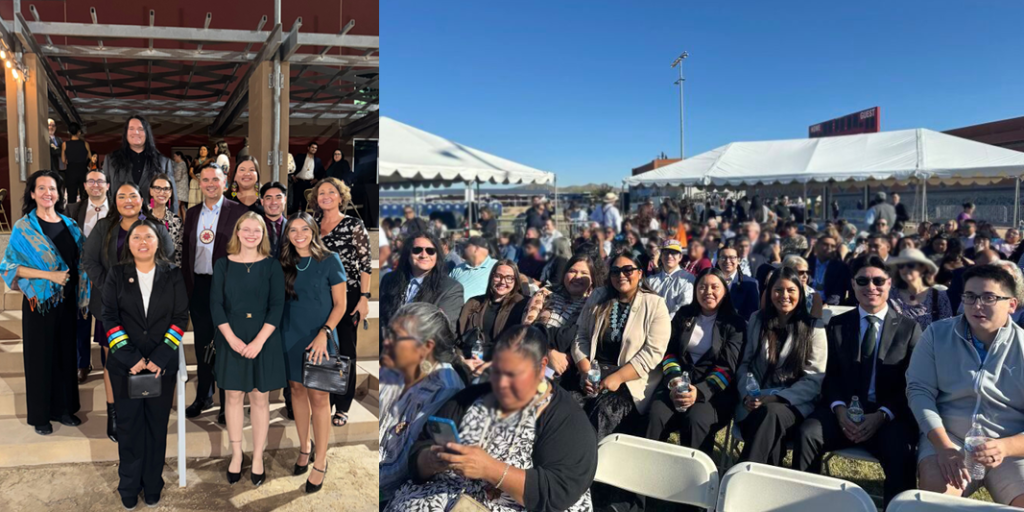
The following day, Oct. 25, ILP students were invited to witness a historic moment: President Biden’s public apology to Native Americans on behalf of the federal government’s role in the Indian Boarding School system. This profound event took place on the tribal lands of the Gila River Indian Community. It was a remarkable opportunity for ILP students to be part of a pivotal moment in history, fostering healing and awareness for generations to come.
INSPIRE at ASU Law
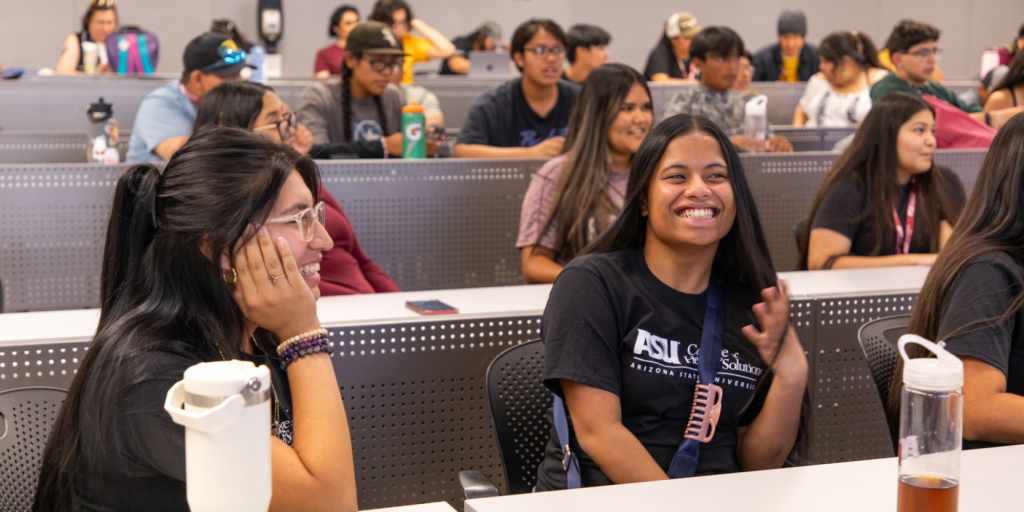
On June 19, 73 Native American high school students representing 22 Tribal Nations participated in the INSPIRE program and visited the law school to learn about the Native American Pathway to Law Initiative. ASU’s Office of American Indian Initiatives hosts the INSPIRE program annually, a week-long college readiness initiative for Native American high school students from various Arizona Tribes. Kate Rosier, ILP executive director, and Crispin South, second-year law student and president of ASU’s Native American Law Students Association, delivered presentations and facilitated mock trials where students argued their positions in the cases. Patty Ferguson-Bohnee, director of the Indian Legal Clinic, and Danielle Williams, communications specialist, distributed promotional items to the students.
We express out gratitude to the Office of American Indian Initiatives for continuing to provide this enriching experience.
Annual Celebration
The Federal Bar Association Indian Law Conference provides a distinctive opportunity for legal practitioners and advocates to convene and engage in comprehensive discussions concerning the future of Indian Country. It’s also a moment when we gather to recognize and honor Indigenous achievements.
The ILP community met at Sandia Resort for its 23rd annual Alumni & Friends Awards Ceremony & Reception. The evening was brimming with heartfelt messages and inspiring success stories as attendees celebrated this year’s award recipients. Brian Garcia (’20) was honored with the Alumni Service Award and Krystalyn Kinsel (’15) received the Emerging Leader Award. The reception also provided an opportunity for past participants of the Native American Pathway to Law program to connect and explore new opportunities.
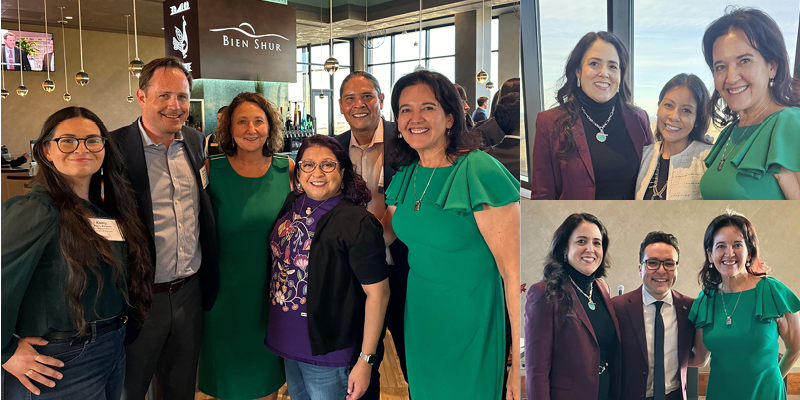
At this year’s Federal Bar Association Indian Law Conference, three members of the ILP family delivered insightful presentations. Matthew Campbell (’08) spoke on a panel “Protecting Sacred Places– Shortcomings and Available Tools;” Rebecca Ross (’10) addressed “Case Law Developments in Tribal Nations’ Ability to Protect Their Interests Through Sovereign Immunity;” and Michael-Corey Hinton (’11) delved into “Representation Matters: Ethical Considerations in Representing Your Tribe.”
The National Native American Bar Association (NNABA) also held its annual meeting, followed by the Justice is Medicine Celebration and Awards Dinner. The first part of the meeting included a Voting Rights Summit coordinated by Blair Tarman-Toner (’21) and Torey Dolan (’19). During the summit, ILC Director Patty Ferguson-Bohnee presented on the Arizona Native Vote Election Protection administered by the ILC. Ferguson-Bohnee, Campbell, Garcia and Professor Paul Spruhan presented on a panel “Preparing for 2024 Native Voting Rights Summit.” During the afternoon portion of the meeting, the Honorable Diane Humetewa (’93) spoke on “Pathways to the Federal Bench.” During the reception, Kate Rosier , assistant dean of community engagement at ASU Law and executive director of ILP, was honored with the inaugural Community Keeper Award.
It was a pleasure to reunite with everyone and celebrate our mighty Indian Law community, which is filled with remarkable advocates who are committed to public service, advancing opportunities for Indigenous law students and strengthening Native American representation in the legal field.
Tribal Justice
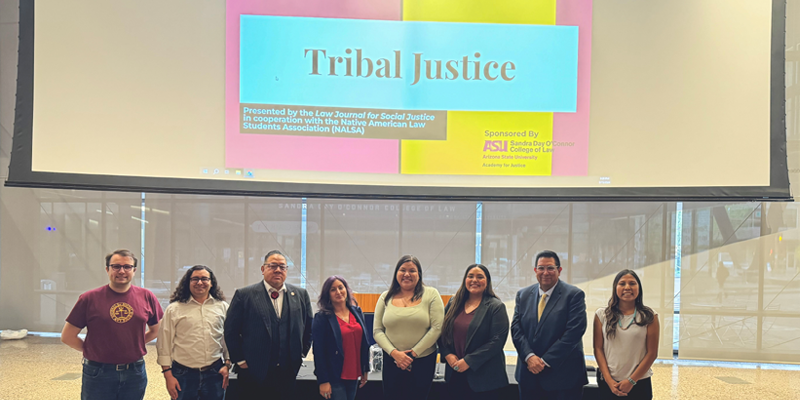
ASU Native American Law Students Association and Law Journal for Social Justice joined forces to host a symposium on March 15. The Symposium of Tribal Justice informed the audience on Federal Indian law and Tribal Law and how Tribal Nations form and regulate their justice systems in alignment with both cultural values and protecting their communities.
Natalia Sells, a third-year law student, helped organize the event and explains the difference between Federal Indian law and Tribal law: Federal Indian law is the federal government constraining or relaxing the constrictions they have placed on a tribe’s inherent sovereign authority, whereas tribal law is the tribe exercising their inherent authority. Tribal law is important because it’s the tribe exercising their sovereignty and power for the benefit and protection of their people and could be aligned with cultural values.
Derrick Beetso (’10), professor of practice and director of Indian Gaming and Tribal Self-Governance programs, presented on Jurisdiction in Indian Country, and Alfred Urbina, attorney general for the Pascua Yaqui Nation, presented on the Tribal Law and Order Act (TLOA) and the Violence Against Women Act (VAWA). Presenters on the Tribal Judges panel included April Olson (’06), chief judge for Tolowa Dee-ni’ Nation, appellate judge for Hualapai Nation and appellate judge for Fond du Lac Band of Lake Superior Chippewa, and Honorable Anthony Hill (’06), chief judge of the Gila River Indian Community Court.
“What I loved best was all the speakers are Indigenous attorneys working towards the mission of strengthening tribes,” said Sells. “The presenters are truly our role models about the good work our law degrees can accomplish in Indian Country. I had never considered it before until I had the opportunity to work for a tribal court and upon meeting Judge Hill. Judge Hill always spoke highly about the role a tribal court judge had in the community, especially when one is from the community. I see serving as a tribal court judge as a great way to help one’s community in providing a stable judicial system that upholds tribal law that was enacted with the people and culture in mind.”
We appreciate ASU NALSA, LJSJ and the Academy for Justice for organizing a great event!
Wiring the Rez 2024

We hosted our 10th annual Tribal Government E-Commerce CLE Conference, Wiring the Rez, last week. Leaders, advocates and stakeholders from Tribal communities and beyond shared, discussed and celebrated together at Wild Horse Pass Resorts & Casinos.

This year featured a Tribal leader retrospective on e-commerce, a timely political update, current cybersecurity concerns and explored uses for AI in e-commerce. If you would like to suggest topics for next year, please let us know.
A big thank you to each of our esteemed speakers and sponsors for a successful turnout. See you next year!
Celebrating excellence, one award at a time
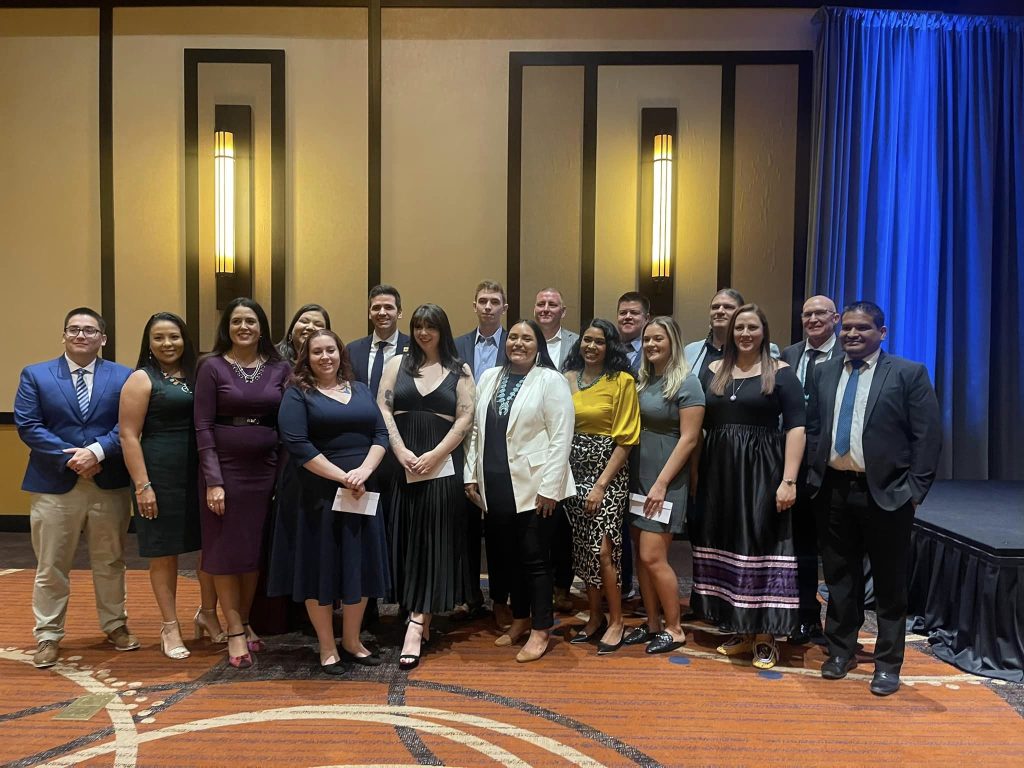
The Native American Bar Association of Arizona (NABA-AZ) held its 2023 Annual Seven Generations Awards Dinner and Silent Auction and honored several of our ILP family. Congratulations to this year’s award recipients! ILP advisory council member Judith Dworkin received the Lifetime Achievement Award, Angela Willeford-Salazar (MLS ’23) with the Office of Congressional & Legislative Affairs’ Get Out the Vote Committee received the Community Leadership Award and Kiyoko Patterson (’03) received the Member of the Year Award.
Eleven ASU Native American Law Students Association (NALSA) students received the NABA-AZ Scholarship for their academic achievement. Congratulations to ILP students: Rachel Carroll (3L), Keely Driscoll (2L), Shandiin Herrera (2L), Clayton Kinsey (3L), Kaleb Lester (2L), Sadie Red Eagle (2L), Maryam Salazar (3L), Natalia Sells (3L), Ronnie Strode III (1L), Alexandra Trousdale (3L) and Makai Zuniga (2L).
The NABA-AZ are integral to student success and we appreciate their commitment to ILP students.
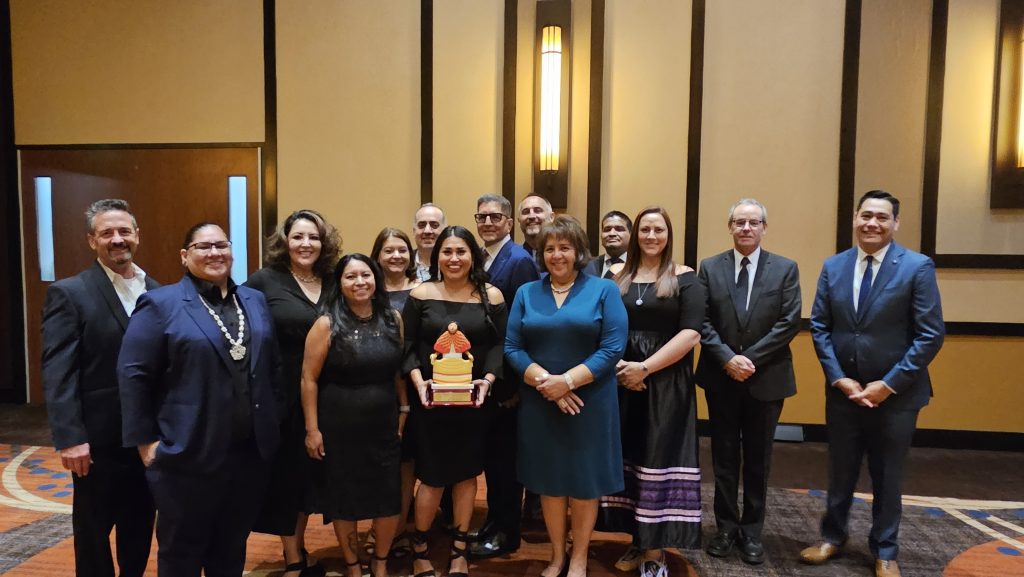
Indian Gaming and Tribal Self-Governance Programs hosts conference at ASU California Center

On Oct. 4, the Yuhaaviatam of San Manuel Event Center at ASU California Center hosted the Indian Gaming and Tribal Self-Governance Programs to learn more about Trends in Indian Gaming. Participants were warmly welcomed by Chairwoman Lynn Valbuena from the San Manuel Band of Mission Indians.
Steve Bodmer (’06), from the Pechanga Band of Indians led the event discussing “Current Trends in Indian Gaming – A West Coast Perspective.” Third-year law students Maryam Salazar and Clayton Kinsey facilitated the next panel on the “West Flagler Litigation,” and they were joined by ASU Law’s Indian Gaming and Tribal Self-Governance Director Derrick Beetso (’10), Steve Hart from Lewis Roca and Timothy Evans from the San Manuel Band of Mission Indians.
Christy Hubbard from Lewis Roca engaged the audience at lunch with “‘20 Pairs of Gladiators’ and JB Smoove Walk into a Bar in Pompeii . . . Sports, Gambling, & Advertising Law for Every Age (You’ve Come a Long Way Baby).” Salazar and Kinsey also facilitated the final panel, “Lessons from Lac du Flambeau,” and were joined by Ron Rosier (’95) from Lewis Roca and ASU Law Professor Laura Coordes.
Thank you to our speakers and host for a successful event. We appreciate the San Manuel Band of Mission Indians’ support of legal education for American Indians and Lewis Roca for sponsoring coffee.
For anyone who could not attend, a recording will be available on the Indian Gaming and Tribal Self-Governance Programs website:
law.asu.edu/igg
Increasing Native representation at the American Bar Association

At this year’s annual ABA meeting, lawyers and legal advocates gathered to support two prominent Native American legal warriors: John Echohawk (Pawnee Nation) and Mary Smith (Cherokee Nation.)
John Echohawk, executive director of the Native American Rights Fund, received the ABA’s Thurgood Marshall Award for his service in protecting and fighting for the rights of Indian Country. Dallin Maybee (’11), NARF director of development, sang the honor song with Steve LaPointe.
Stacy Leeds, the first Indigenous dean at the Sandra Day O’Connor College of Law, administered the oath ceremony for Mary Smith, the first Native American woman to lead the American Bar Association.

Congratulations to both John and Mary! Your leadership greatly bolsters Native Americans in the legal profession and strengthens Indian Country.

